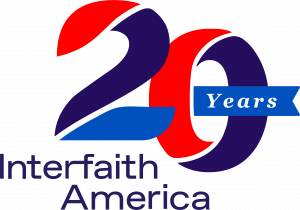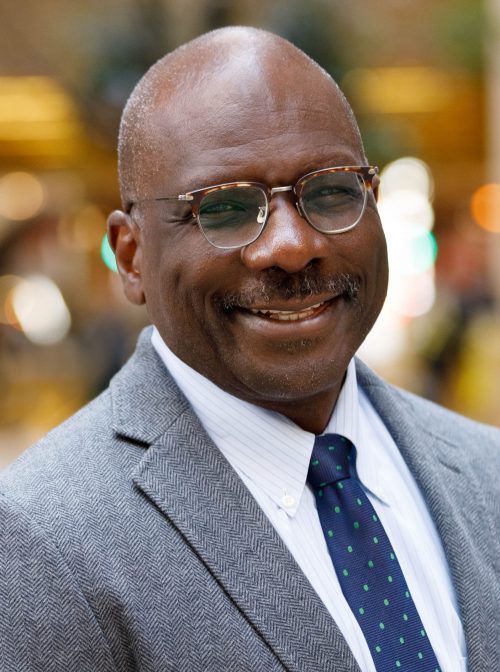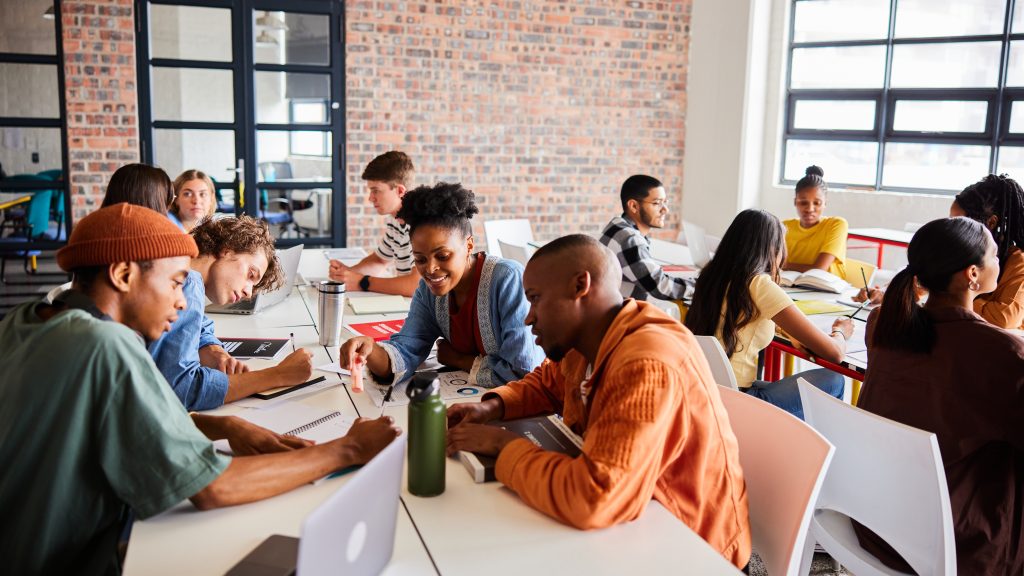To mark the 20th anniversary of Interfaith America, we spoke with individuals connected to the organization about their own interfaith work, memories of Interfaith America, and their hopes for the future of interfaith cooperation.
Interfaith America Magazine’s Allie Vroegop interviewed the Rev. Fred Davie, Senior Advisor for Racial Equity at Interfaith America, who executes programming with a primary focus on the intersection of race and religion. Rev. Davie speaks about his interfaith upbringing and what he envisions for two racial equity initiatives: Black Interfaith Project and the Vote is Sacred.
This conversation was lightly edited for length and clarity.

Allie Vroegop: Can you share how you got involved with interfaith work and also with the work of Interfaith America?
Fred Davie: My life is sort of an interfaith life, starting as an ecumenical life, in my little town in Belmont, North Carolina, where there was no option but [to have] cooperation and engagement across denominational lines. This was within the Protestant traditions where most of the faith organizations were in that town, most of the Black ones, which was my primary early experience, and then across Protestant/Catholic lines, because [I had] a lot of family who were also Roman Catholic.
Then in my teen years, members of my family converted to Islam, and having that level of engagement, knowledge, and awareness, and [I came] to an understanding that Black Islam would be very active in my family’s life. It opened me up in my teenage years to greater possibilities. That continued in college, and it expanded considerably when I got to Yale Divinity School with all the conversations there about interfaith relations and interfaith engagement. Then once I came to New York City right out of school, it was my reality. I was doing faith-based community development work and pretty much all faith traditions were represented in this work. In fact, when I was a young minister, one of the people I met on the Jewish side was a young rabbi named Rick Jacobs, who is now the president of the Union for Reform Judaism. It started very early on, and it only evolved more.
I got to know Eboo when I met with him at the Ford Foundation, at the recommendation of a mutual friend and colleague, Ruth Messinger. And then we got to know each other at the Obama White House on the day we both became members of the Advisory Council [to the Office of Faith-based and Neighborhood Partnerships]. Then he invited me to join the board [of what was then IFYC], and while on the board, I moved to the Union Seminary where we did some joint programming.
One of the things that really attracted me early on about IFYC, now Interfaith America, was the work on college campuses. I just thought that that was genius in the sense that if there’s any place you want to start interfaith cooperation is to have young people, and if there’s any place where you’re going to find a diverse group of young people, it’s generally on college campuses. As we’re seeing even on some of the more religious campuses, you have religious diversity. What better way to do it than around service projects, that if you want to make interfaith cooperation a norm, then that seems to be a great place to do it. Then, this partnership with the Obama White House with the President’s Challenge, that expanded exponentially. That’s the beginning of my personal and professional journey, and then my early involvement with Interfaith America.
AV: What’s a special memory you have of your work with IA?
FD: I would say that that is going to always be that meeting with people at the White House. There you had a diverse group of people in the Roosevelt Room, waiting to go see a president who represented that diversity, in some ways, is very big. Eboo and I met there and that’s led now to this 13-year long friendship that is so rich, rewarding, and meaningful. That will always be a marker and a very special memory because it was my formal start, in a way, with Interfaith America.
AV: Is there something about Interfaith America’s work that you’re especially proud of?
FD: I would say the development of a cadre of leaders that you can find in almost every sector of American society. That’s exactly what the country needs if it’s going to survive this onslaught, where diversity in way too many quarters is not celebrated for the richness that it is. I would think that the organization should take a big collective bow for the leaders it has developed and continues to develop as witnessed at the last Interfaith Leadership Summit.
I will also say, I’m proud of the Black Interfaith Project, along with the Voted Is Sacred – they’re two very unique programs. One speaks to an overlooked phenomenon in American history and current existence that is Black interfaith cooperation, and the other seeks to appreciate the history of and maintain the sacredness of a fundamental aspect of American democracy: the right to vote and access to the ballot. Leadership development, Black Interfaith, and the Vote Is Sacred are three that really stand out as big achievements.
AV: Is there anything that you hope to see in the organization’s future?
FD: What gives me inspiration is that Interfaith America will continue to be a force in cultivating and sustaining this, the world’s first religiously diverse democracy. I think it is a gift to humanity to show what can happen in terms of human cooperation in a space like this. I think recent events should show us we should never take it for granted. Interfaith America has a very special role to play in ensuring the future of this democracy and the peaceful transfer of power from one election to the other. I hope IA only grows and becomes more significant in that role.




